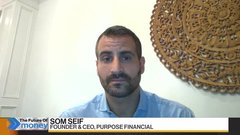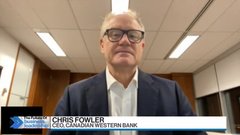May 15, 2020
Behind the scenes of Canada's COVID-19 emergency response
Behind the scenes of Canada's COVID-19 response
In late January, Finance Minister Bill Morneau traveled to the World Economic Forum in Davos, Switzerland to discuss Canada’s economy. The labour market that the federal government so often touted as a symbol of the country’s relative strength had just delivered another big month of gains: 27,300 new jobs created in December and an unemployment rate of 5.6 per cent. The economic devastation that would ravage Canada and propel the jobless rate into double digits was nowhere on the radar.
“We aren’t looking at a downturn, but we need to be prepared for challenges,” he told Bloomberg Television during an interview at the prestigious annual gathering of business leaders and policymakers. “I’m making sure we have the capacity to react to any issue.”
One issue on the minds of Davos attendees was the spread of a novel coronavirus in China.
Morneau’s team was told ahead of the event that Chinese officials would not be available for meetings. Those officials were back home, ramping up efforts to contain the spread of the respiratory illness.
At the time, nine people had died in China from the virus amid 440 confirmed cases. That week, the United States had confirmed its first case — a man in Seattle, who had recently traveled to Wuhan, China.
"We're in great shape and I think China is in very good shape also," U.S. President Donald Trump told reporters on the sidelines of the World Economic Forum.
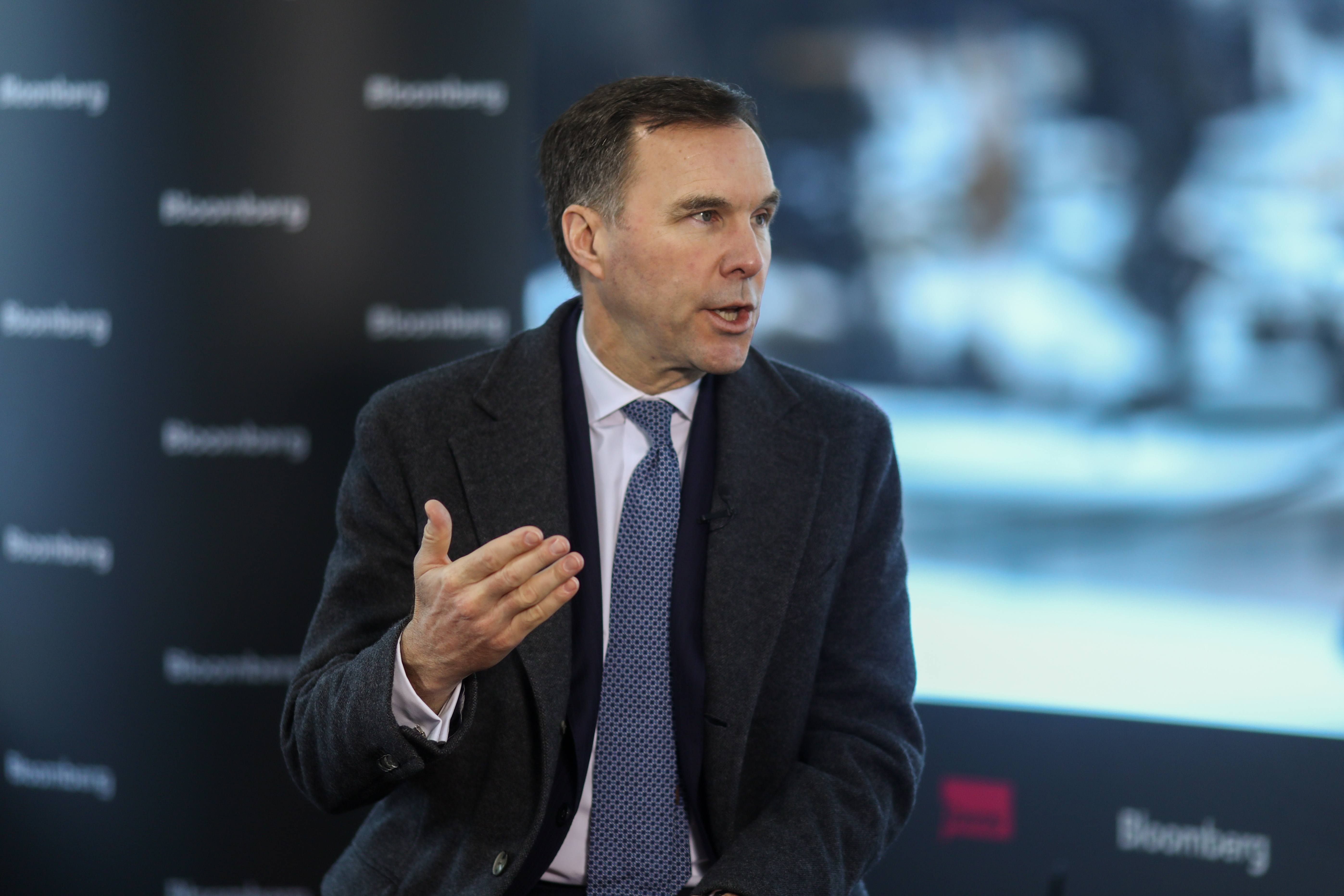
Several weeks later, in late February, China skipped another high-profile event that Morneau attended — a gathering of G20 finance heads in Saudi Arabia. The summit was expected to focus on the global growth outlook and how to tax tech giants like Facebook Inc.
As leaders made their way to Riyadh, the total number of COVID-19 cases worldwide had soared to more than 76,000 and the number of deaths had topped 2,200 — the vast majority in China.
A week before the gathering, the World Health Organization had announced an official name for the novel coronavirus, which was now being labelled as a global health emergency: COVID-19.
“This outbreak could go in any direction,” WHO director general Tedros Adhanom Ghebreyesus said during a press conference in Geneva on February 21. “If we do well, we can avert any serious crisis, but if we squander the opportunity then we will have a serious problem on our hands.”
Stock markets at the time were still just a few days removed from all-time highs, but investor concerns were rising. As the G20 meeting wrapped up, Morneau and other finance heads vowed to take action if needed.
On the long flight home, Morneau prepped for the upcoming federal budget, which had not yet been announced. He also began to contemplate the potential economic fallout from COVID-19.
Within three weeks, those narratives would become firmly entangled.
“The forecast around the economy has to take into account the coronavirus,” Morneau told reporters on March 11 after unveiling the planned date for this year’s budget. “That forms, for us, the basis of our planning, in deciding what we will do to use our very strong fiscal position to protect Canadians and protect our economy.”

The pandemic has cratered Canada's economy like never before and pushed the finance department into triage mode. Throughout, Bill Morneau has been doling out the billions that may take generations to repay. Based on interviews with government insiders, as well as some of this country's top policy experts and business leaders, a clearer picture has emerged about the race against time to shield Canada's economy from an outbreak that threatens the worst downturn since the Great Depression.
“[Morneau] has an extraordinary responsibility,” said former Finance Minister Joe Oliver, who served in Prime Minister Stephen Harper’s cabinet, in an interview with BNN Bloomberg. “Everything which has dollars associated with it is funneled through finance. It’s critical.”
The list of economic uncertainties is long. High-profile Bay Street economist David Rosenberg has described the current environment as a global depression. Canada’s oil industry, meanwhile, is dealing with a price shock that could take years to recover from. All this as the Liberal government attempts to build the Trans Mountain pipeline expansion, not to mention navigate an unpredictable relationship with the Trump administration in the United States.
While the stakes are high, Morneau — now in his fifth year in his finance role — has appeared calm under pressure.
“This is like being finance minister during World War II,” veteran pollster Nik Nanos, chairman of Nanos Research Group, told BNN Bloomberg. “This will be the defining moment of his tenure, without question. And so far, so good.”
‘We were watching the stock market sink’
Morneau’s plan to deal with the fallout from COVID-19 took shape in the first week of March.
He was scheduled to speak on Friday, March 6 at an event hosted by the Canadian Club of Toronto.
The finance department was neck-deep in budget preparations and the speech was seen as an opportunity to outline some of this year’s big themes.
But the week had begun with growing fears of a global economic collapse.
The U.S. Federal Reserve slashed interest rates on March 3 to address the potential impact from the virus. The Bank of Canada quickly followed suit by cutting rates half a point the next day. It was Canada’s biggest rate cut since 2009 and its first in four years.
At the time, there were less than 50 confirmed cases of COVID-19 in Canada.
“This is clearly on people’s minds – as it should be,” Morneau told BNN Bloomberg, following his Canadian Club remarks. “We need to think about how we protect people if they’re off work, how to protect businesses if they don’t have the kind of sales or the access to the supplies that they need.”

Morneau staffers planned to spend the weekend gearing up for the budget, but new complications emerged.
On the Saturday, Saudi Arabia launched an oil price war with Russia. The move further threatened Canada’s energy industry.
As they pushed ahead with their budget-related conference calls, Morneau’s team found themselves worrying about the headlines on oil’s tailspin and new details on the spread of COVID-19.
On the following Monday morning, investors panicked about an economic tsunami. Stocks plunged immediately after the opening bells, triggering a rare 15-minute trading halt to prevent the market from going into freefall.
“We were watching the stock market sink. And we just knew it was a pivotal moment,” said one of the government sources BNN Bloomberg spoke with and whose identities are being protected because they weren’t authorized to speak on the record.
The chief executives of Canada’s big banks were watching, too. Word spread that Royal Bank of Canada CEO Dave McKay and other leaders wanted to get a dialogue going and Morneau was equally interested in speaking with the group.
Everyone connected late that Monday night.
They were joined on the call by Bank of Canada Governor Stephen Poloz and the Superintendent of Financial Institutions, Jeremy Rudin.
While it’s not uncommon for the finance minister to speak with the bank bosses, communication increases during emergencies.
“There’s a lot of coordination to ensure that the system continues to operate during this period of crisis when things have a tendency to seize up,” former Royal Bank CEO Gord Nixon recently told BNN Bloomberg.
According to sources, the group addressed the market volatility and agreed they would need to keep talking. The call set the stage for what would become a weekly check-in over the next several weeks, on top of individual conversations Morneau would keep having with bank executives.
"In a time of unprecedented economic disruption, our government has acted with urgency and taken a collaborative approach to solutions, providing meaningful relief to Canadians,” CIBC CEO Victor Dodig told BNN Bloomberg in an email.
As Morneau coordinated with the banks on that first Monday night call, he was also coordinating with the prime minister on what would become the initial fiscal response to the virus.
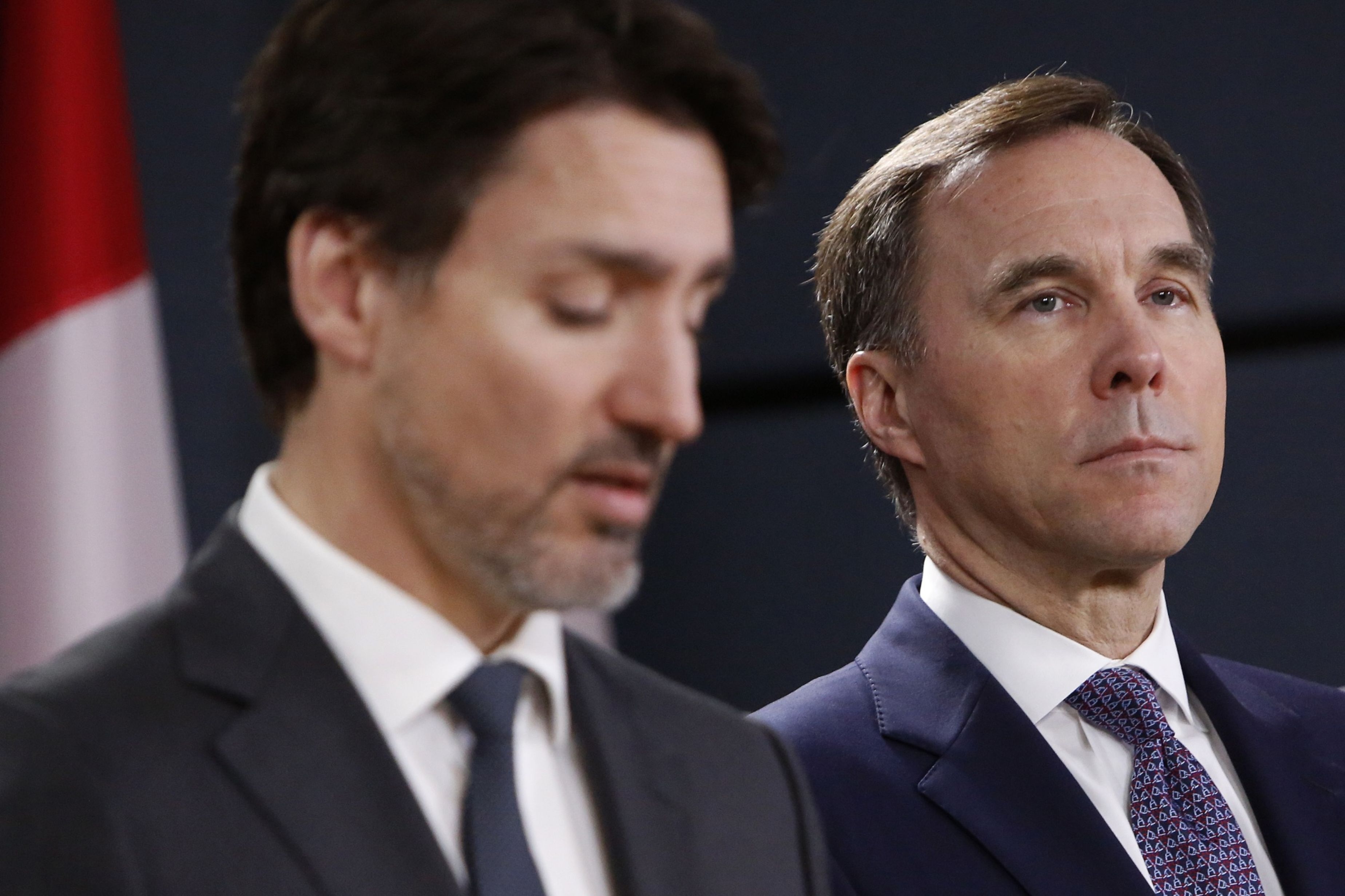
Dusting off the playbook
On Wednesday, March 11, as the World Health Organization declared COVID-19 a global pandemic, Prime Minister Justin Trudeau pledged $1 billion to help the heath-care system and economy cope.
“We are pulling out all the stops to make sure Canadians stay safe, healthy, and supported,” he said during a news conference on Parliament Hill.
That same day, Morneau told the House of Commons the budget would be delivered on March 30, while acknowledging that COVID-19 was impacting spending plans.
And while all of this was happening, stocks kept sliding.
The S&P/TSX Composite Index closed that day in a bear market, after falling 20 per cent from its February high.
The next morning, more investor panic triggered fresh trading halts on the stock market.
By the end of the day, the TSX had plunged more than 12 per cent — its largest single-day decline since 1940.
Some of the country’s biggest investors began to send very public messages to Ottawa.
“I think there does have to be a government response,” said Kevin Uebelein, CEO of the Alberta Investment Management Corporation (AIMCo), during a BNN Bloomberg interview that day. “I’m not a policy maker, but they can go back to some of the old playbooks from the global financial crisis.”
“When it was clear we would be going into a recession, the first thing they did was get the playbook out from 2008 and ensure that we didn’t have a liquidity crisis,” Former Liberal Finance Minister John Manley told BNN Bloomberg.
After the markets closed that day, the Bank of Canada announced plans to pump billions of dollars into the financial system to shore up stability.
Still, the government felt another confidence boost might be needed that evening.
The prime minister was not on Parliament Hill. He had disclosed earlier in the day he was self-isolating as his wife Sophie Grégoire Trudeau awaited details from a COVID-19 test.
Morneau held an impromptu news conference to emphasize that financial aid was on the way.
“I know Canadians are anxious about the volatility we saw in the stock market today,” Morneau told reporters. “We want them to know that we will have their back.”
Morneau had frequently been in touch with U.S. Treasury Secretary Steve Mnuchin and planned to speak with him again that night. The pair, who text regularly, have been friendly since Morneau attended Mnuchin’s wedding in 2017.
“Bill and I have worked together closely on a range of U.S./Canada issues as well as other priorities in the G7 and G20,” Mnuchin told BNN Bloomberg in an email. “Bill has acted quickly and decisively during this coronavirus challenge, and I value our partnership as we work together to support our nations’ economies during this time.”
'Whatever it takes'
On Friday, March 13, Parliament was suspended for five weeks. And the budget — scheduled for the end of the month — was off the table.
With COVID-19 fears mounting, Trudeau urged Canadians to avoid all non-essential travel outside of the country.
The Bank of Canada also lowered interest rates again in its first emergency rate cut since the 2008 financial crisis.
It was increasingly clear that using just the playbook from the previous crisis would not be enough.
“What wasn’t like 2008 was that the government mandated a shutdown of the economy,” Manley said.
That afternoon, the finance minister made a rare press conference appearance alongside Poloz.
The two leaders often speak ahead of interest rate decisions. But normally they maintain some distance due to the bank’s cherished independence.
They were joined by OSFI’s Jeremy Rudin.
Morneau promised to do “whatever it takes” to keep the economy afloat and teased more stimulus was on the way.
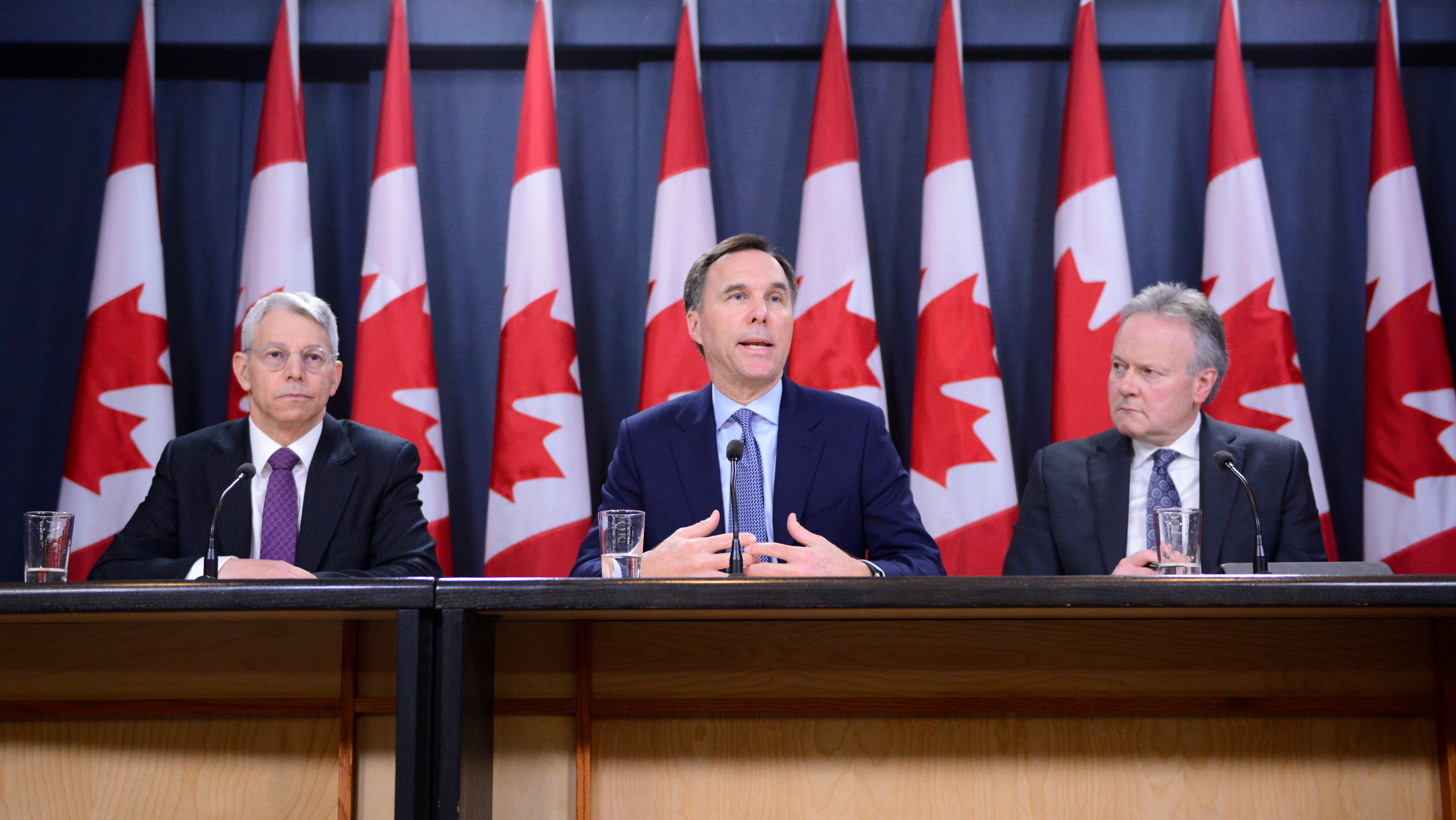
That stimulus came in the form of an $82-billion aid package now known as Bill C-13, which was unveiled by the prime minister the following Wednesday.
It would include $27 billion in emergency assistance for workers and $55 billion in temporary tax deferrals for households and businesses.
“There are many families across this country who are looking at their sources of income drying up because of COVID-19,” Trudeau said. “Many workers do not qualify for EI. Therefore, we are putting in place exceptional measures that will flow money to them every two weeks.”
The massive spending plan would need fast approval from lawmakers. Morneau quickly found himself preparing for the flood of questions he would undoubtedly face in the House and Senate.
“The first time he came into the Senate to discuss the bill, he did so without any officials or notes,” said Peter Harder, an independent senator who previously served as the Liberal government’s representative in the upper chamber, in a phone interview with BNN Bloomberg.
“He dealt with questions on a broad range of subjects for more than an hour. He engendered great confidence that there had been appropriate considerations,” he added.
But political tensions were building.
The initial draft legislation was revised after opposition members balked at giving the Liberal government wide-reaching new powers to tax and spend without parliamentary oversight until the end of 2021.
“We will not sign a blank cheque,” Conservative Party of Canada Leader Andrew Scheer said in a statement on March 23.
The outcry prompted revisions to the bill and Morneau found himself back in the House and Senate that Wednesday, pushing things to the finish line.
“I’m asking my honourable colleagues to support this legislation,” Morneau said in the Senate. “There can really be no delay.”
Bill C-13 — which had by then grown in size to $107 billion — received Royal Assent that day.
“He’s just a true professional,” said Harder. “He continued to demonstrate a calm, mature crisis management style that gave everyone confidence in these difficult times.”
- Canada sees record job losses in April, shedding almost 2M positions
- Budget watchdog stunned at pace of Canada's COVID-19 emergency spending
- Feds to limit dividends, buybacks with funding for largest companies
READ MORE: COVID-19 ECONOMIC FALLOUT
The need for speed
Bill C-13’s approval paved the way for signature crisis programs, such as the Canada Emergency Response Benefit (CERB) and the Canada Emergency Wage Subsidy (CEWS).
The CERB and CEWS names came together as staff bounced ideas around over email, in search of a simple, inoffensive acronym.
The specific details of CERB, unveiled on March 25, came together in less than a week, according to sources.
While there was not enough time for traditional means testing, it was decided a $2,000 monthly payment would cast a wide enough net to cover Canadians who were losing their jobs.
“The history of the Great Depression is partly the result of a very inadequate and late response to an economic crisis. And so with that history in mind, governments around the world have understood the need to move quickly,” said former Finance Minister Joe Oliver.
Some of Morneau’s thinking during COVID-19 has been shaped by the years he spent building Morneau Shepell Inc. into the country’s largest human resources consulting firm.
The business specializes in the relationship between employees and employers — a crucial subject as the government seeks to curb a rapidly rising unemployment rate.
“It’s a dramatic undertaking,” RBC Chief Economist Craig Wright told BNN Bloomberg.
“They are working day and night to roll out policies in days, rather than years,” noted Wright, who also served as RBC’s chief economist during the 2008 financial crisis.
The realities of rolling out massive aid packages during a pandemic means that details are often figured out remotely — either on phone calls or video conference chats. Staff are spread out, working from home in cities such as Toronto, Montreal and Ottawa.
Morneau himself is said to have logged his fair share of hours driving between Ottawa and his home in Toronto.
Wright calls Morneau’s approach “lean and clean” fiscal policy.
“You lean in by supporting businesses through programs like the wage subsidy. And you clean it up by supporting those who have lost their jobs, with programs like CERB.”
A last minute change to administer CERB through the Canada Revenue Agency (CRA) instead of the employment insurance system helped ensure a smooth rollout of the program.
“I was very insistent on having a fully automated system and one flat rate payment for everyone,” Employment Minister Carla Qualtrough told BNN Bloomberg last month.
To date, the government has processed more than 11 million CERB applications and paid out in excess of $30 billion in benefits.
“Everyone thinks of governments as being glacial. But it is astonishing the speed at which the CERB payments have been processed,” said former TD Bank Chief Economist Don Drummond, who worked in the finance department for 23 years, in a recent BNN Bloomberg interview.
Given the need for speed, the government is continuously tweaking programs.
“We never expected that we’d get it perfect from day one,” Trudeau told reporters on April 23. “But we couldn’t let the perfect be the enemy of the good.”
At times, the finance department is still ironing out the final details of programs on days when they are unveiled.
The Canada Emergency Commercial Rent Assistance program, for example, was announced during one of the prime minister’s daily briefings to the nation. Finance officials were quietly still negotiating with the provinces on the specifics, which were announced eight days later.
‘A pretty challenging position’
Pollster Nik Nanos says Morneau’s approach during COVID-19 is noticeably different than in 2017, when he was on the defensive during a fiasco about tax changes for small businesses that raised questions about how long he’d remain finance minister.
“Part of the problem was that the government wasn’t agile and didn’t respond,” Nanos said about that uproar. “Things needed to be adjusted. In a way, what I see now is a government that learned from that experience.”
Even those who criticized some of the initial programs rolled out by the government have acknowledged the hurdles.
“I wouldn’t want to be finance minister right now,” Laura Jones, executive vice-president of the Canadian Federation of Independent Business (CFIB), told BNN Bloomberg in April. “That’s a pretty challenging position to be in and they’re making these announcements before they’ve even worked out the details of the programs.”
Poloz, who is nearing the end of his seven-year term at the Bank of Canada, has had an equally challenging role.
On March 27, the Bank of Canada cut interest rates for a third time that month. It also announced a large scale asset purchase program — what was considered to be a step towards quantitative easing.
“Some may suggest this is using a lot of firepower but I think a firefighter has never been criticized for using too much water,” Poloz told reporters.
He was joined once again at the press conference by Morneau, as part of their desire to display a united front during the pandemic. Morneau even shared his family’s coronavirus concerns.
“Two of my own loved ones right now have COVID-19. One of my sisters who lives in Europe and my godson in the United States. They’re both doing well and I know they’ll get through this. But it is most certainly a challenge for everyone.”
Morneau continues to spend his days dealing with piles of proposals on how to deal with the COVID-19 fallout.
“We’re getting impatient,” said Heather Reisman, Chair and CEO of Indigo Books & Music Inc., in an interview with BNN Bloomberg. “I think what we’ve seen is a couple of good moves by the government. But they’re at the very very beginning of, frankly, taking the steps to help this economy get back on track.”
Beyond sorting through bailout requests from businesses, members of the Liberal caucus have sometimes sought questionable financial support for their own ridings, according to sources.
“Finance has to get the money out fast,” said one senior government official. “The department itself is one of the most well-oiled policy machines. Anyone in the role of finance minister tends to have to play the bad cop. Everyone wants money for what’s important to them but there isn’t infinite money to spend. Decisions have to be made on strong and grounded data and policy. This is often difficult in this kind of setting as MPs tend to become fixated on what is important in their ridings versus the country. In a crisis, electoral gains cannot trump the best or right policy.”
Coordinating with Canada’s bank CEOs has also had its moments of tension.
Morneau has considered the liquidity that banks provide to be a crucial part of the country’s economic survival.
At times, though, he has found himself balancing the government’s desires with those of certain banks, according to two people familiar with the discussions.
The government is said to have leaned on Senator Sabi Marwah, a former Bank of Nova Scotia executive, for advice on how to navigate the talks with Bay Street.
Ultimately, the government’s efforts have been essential, according to CIBC’s Victor Dodig.
“Their level of engagement and cooperation was the foundation for a coordinated response to this challenging situation, allowing us to make significant progress in a short period of time on building and delivering relief programs,” he told BNN Bloomberg.
One initiative that has grown rapidly through that cooperation is the Canada Emergency Business Account (CEBA) program, which offers interest-free loans of up to $40,000. Nearly 600,000 applications have been approved, with more than $23 billion dispersed.
Meanwhile, there is constant communication with provincial leaders, as economies across the country start to re-open.
“As finance ministers, we’re also focused on the next phase - recovery,” Ontario Finance Minister Rod Phillips told BNN Bloomberg.
The two leaders have known each other for more than a decade and speak regularly. They previously worked together for two years following Morneau Sobeco’s 2008 acquisition of Shepell-fgi. Phillips had been Shepell-fgi’s CEO.
“Minister Morneau and I are working together to deliver relief and find solutions to the unprecedented economic hardship caused by COVID-19,” Phillips said.
A ballooning deficit
Unprecedented hardship has also meant unprecedented levels of spending, with the government already committing more than $150 billion in coronavirus-related aid.
“It’s raining money from Trudeau like Post Malone at a nightclub,” said Dream Office REIT CEO Michael Cooper in a recent BNN Bloomberg interview. “Who knows if the consequences will be significant or not.”
Even Canada’s budget watchdog is amazed by how quickly the country’s fiscal outlook has deteriorated as a result of measures designed to limit the economic damage from COVID-19.
“Had you asked me two months ago if we would be contemplating a deficit of close to $200 billion, I would have said that somebody is smoking something very strong,” Parliamentary Budget Officer Yves Giroux told BNN Bloomberg last month.
“These are some of the biggest expenditures that have ever been done in Canadian history,” Morneau acknowledged in an April interview. “My goal right now is to make sure we get through this — to make sure that our economy can be strong again after this crisis.”
Indeed, until the re-opening of the economy is complete, some observers say it’s too early to focus on long-term fiscal consequences.
“I don’t think we’re there yet,” former Canada Pension Plan Investment Board CEO Mark Wiseman recently told BNN Bloomberg. “We have to continue to ensure that we have that heart beating in our economy so that we have the recovery. And the government has done well in this regard.”
Morneau, an avid runner who can sometimes be spotted running near Toronto’s Don Valley, has encouraged his team to think about the continued fiscal response as a marathon, not a sprint.
“I feel like we’ll find lots to criticize in the aftermath,” said John Manley. “But I think the criteria for success will be measured by whether the economy can regain its footing relatively quickly when this is over.”




